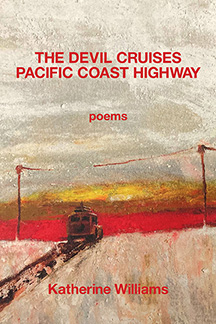Scientific papers
Praise for The Devil Cruises Pacific Highway
“ Throughout The Devil Cruises Pacific Highway, by Katherine Williams, an interesting and engaging distance emerges because of the poet’s insistence on not surrendering to strictly personal gestures, but to find instead a way to include us all in the drama of these poems. The poet is equally comfortable and proficient in strict metrical forms – her English Sonnets are among the best of these poems – as well as in a jazzily modulated free verse that moves down the page like a chant, and experimentally formal poems that challenge the poet and the reader to put form and content together most intimately, the way they’re supposed to be.
Woven into the tapestry of these poems is a bright thread of irony, illustrative of the way the poet never takes herself too seriously, and when these poems are humorous, the humor comes in the form of a hard lesson. Throughout this collection is such a richness of diction it’s as if the poet is in love with and celebrates the many offices of language in every poem. Surprising figures of speech come and go with the practiced ease of a master. I’m glad I read this book. You will be too.”
—Bruce Weigl, Song of Napalm
“The Devil in this book cruises the Pacific Coast Highway, but travels far from it in person and in dreams. Is the poet the Devil? Well, Katherine Williams suggests it’s possible: “we surfed in our dreams until topsy-turvy/we wiped out into adulthood.” Her poems speak of sand, sky, mountains, stars, poppies, and waves. But more than anything they are about wildness and exotic searches for freedom and joy. This is an entrancing, beautiful book. Read it, and savor these memorable lines: “I was a girl. I am not a girl. I do not know what I am./I walk into the river. The song, the book, the light.””
—Susan Terris,
Familiar Tense
“The beauty of this book is that no-one but Ms Katherine could have written it. Its overarching image is a powerful one: that surfers worth watching don’t cave just because some roller or loose board has left them eating sand. And sure, going back out is risky but in surfing as in poetry, playing it safe’s no good. And because Ms Kknows that, she tries out all sorts of things—from street-talk to science to lyricism, from wild verse to free verse to forms. But none of that would matter in the end, if she weren’t so good at words. Three examples: on surfing, “What is Danger?;” on tenement-talk, “The Plumbing on Oak Street;” and on death, “Three Questions,” one of the most alive poems on that subject I’ve ever seen. One of my favorite line closes “San Quintín Harbor:” “The quiet stones glow like mangos in the sun.””
—Lola Haskins,
Desire Lines






